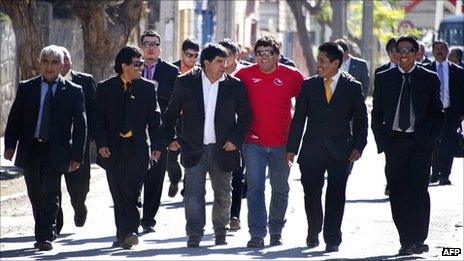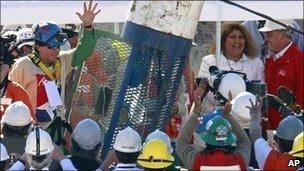A year on, Chile miners' future hopes are unfulfilled
- Published

Told nothing would be the same again, many of those trapped in the Chilean mine have returned to the lives they had before
When the 33 miners who were trapped underground in Chile last year were finally rescued, great things were predicted for them.
They would be rich, films would be made about them, journalists would pay fortunes for their stories, and they would never have to work again.
Reality has been far less kind.
One year on from the accident at the San Jose mine, half of them are unemployed and many of those who do have jobs are working part-time, as mechanics, odd-job men or greengrocers.
Several of the men are on sick leave and are still grappling with the psychological impact of what they went through.
A couple of the 33 have ventured back down the mines, although in places with far better safety records than San Jose, their prison for over two months.
Legal suit
Franklin Lobos, a former professional footballer-turned-miner, has returned to his roots, working as a coach for the local team, Deportes Copiapo.
Perhaps the most successful of the men are those who have become motivational speakers. People are still fascinated by their story, and some of the miners are making a living from retelling it.
"We're 33 different people," says Raul Bustos, who believes he and his fellow miners have all dealt with the psychological impact of their ordeal in their own different ways.
"In my case, I came off sick leave back in December," said Mr Bustos, who works as a guest speaker for a telephone company.
"I've dealt with those problems, but there are two or three of the miners who still have problems. They haven't been able to get over it, and they're still on sick leave."

The Phoenix II capsule, used to winch the men to safety, is now housed in a museum
Those who are off work continue to receive their salaries under an insurance scheme.
Last month, 31 of the 33 launched legal action against the Chilean state, accusing it of failing to do its job properly by allowing the San Jose mine to remain open in the years before the accident.
They are claiming compensation of over $500,000 (£300,000) per man.
The state, in turn, is still pursuing the mine owners in a bid to claw back the millions of dollars spent on last year's rescue. The mine itself remains closed.
'Damaged goods'
"The money-making thing has been slow," says Jean Romagnoli, who was the miners' physical trainer while they were below ground, helping to keep them in shape and stay trim so they could fit into the capsule that was used to bring them to the surface.
"The promises that were made to them when they reached the surface, like for example that they were going to all have a job in the national mining industry, they've all vanished."
Mr Romagnoli says mining companies are reluctant to give the men jobs, regarding them as damaged goods.
"They think they're psychologically unbalanced still, and there's a risk in contracting them," he told the BBC.
"So they're living in a kind of limbo where they're not assured of their future or their wellbeing."
There have been some bright spots over the past year.
The miners have been on trips abroad, all expenses paid.
Between them they have visited over a dozen countries, including Israel, Greece, the United States and Britain, where they watched Manchester United play at Old Trafford.
Edison Pena, the Elvis Presley fan among the 33, has fulfilled his childhood dream of visiting Graceland.
Esperanza, or "Baby Hope", the daughter who was born to one of the miners while he was trapped below ground, is doing well and will soon celebrate her first birthday.
Two of the other miners have also become fathers since they were rescued.
Yonny Barrios, the man who famously had a wife and a girlfriend waiting for him when he got out of the mine, is still living in Copiapo - with the girlfriend.
Nightmares
There are still tantalising prospects of riches for the men, despite their frustrations.
Mike Medavoy, the Hollywood producer whose company made the Oscar-winning film Black Swan, has bought the rights to make a movie about the miners.
Mr Medavoy grew up in Chile, speaks Spanish and appears to have a genuine affinity with the subject matter.
Jose Rivera, who wrote the screenplay for the Che Guevara film The Motorcycle Diaries, has been hired to write the script.
In addition, Pulitzer prize-winning journalist Hector Tobar is working on a book about the miners, based on the diary that one of them, Victor Segovia, kept while below ground. Proceeds from the sale of that book are due to be split between the men.
But, despite those hopes for the future, the present is far from rosy for the 33 men whose fortitude inspired the world last year.
Many are still grappling with the nightmares that occasionally float up from the depths of the San Jose mine to haunt them.
"I still get images in my head," Claudio Acuna told the BBC. "I'm not the person I was before. I find it difficult to sleep, I get irritable, I can't concentrate. They tell me it's normal, it's all part of the recovery process."